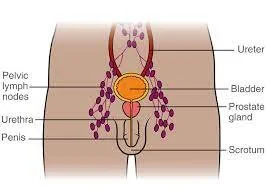Men with prostate cancer with both nodal and bone metastases due worse with ADT plus docetaxel chemotherapy than men with only bone metastases. In addition, increased nodal metastases burden is a negative prognostic biomarker.
A presentation by Dr. Áine Haran at ESMO 2022 discussed an ancillary study from the phase III STAMPEDE trial of docetaxel (chemotherapy) and abiraterone acetate (Zytiga) and prednisolone, specifically looking at the differential treatment responses in men who are hormone sensitive and have metastases in their lymph nodes (soft tissue) (mHSPC). The presentation evaluated the nodal burden (how many positive nodes existed) as a prognostic biomarker.
We know that we need to have a better selection process of men for the addition of docetaxel in mHSPC. Previous work has suggested that increased disease burden correlates with worse outcomes, but the existence of nodal metastases has not been considered in metastatic volume definitions in mHSPC.
The study concluded that men with bone-only metastases treated with ADT + docetaxel had a similar survival benefit (HR 0.62, 95% CI 0.46-0.84). However, the survival benefit was reduced for men with both nodal and bone metastases when given ADT + docetaxel (HR 0.89, 95% CI 0.74-1.07). Higher nodal burden had significantly worse outcomes in both control arms and the intervention arm of ADT +/- abiraterone acetate and prednisolone.
Dr. Haran concluded the presentation by discussing differential treatment response with nodal metastases in mHSPC and evaluation of nodal burden as a prognostic biomarker with the following take-home messages:
The increased nodal burden is a negative prognostic biomarker and should be considered in prospective risk/volume definitions to aid risk stratification in selected patients.
This study also demonstrates for the first time a potential differential response between mHSPC patients with nodal +/-bone metastases versus bone-only metastases for ADT + docetaxel but not for ADT + abiraterone acetate and prednisolone.
Áine M. Haran, Genito-urinary Cancer Research Group, The University of Manchester, Manchester, UK



